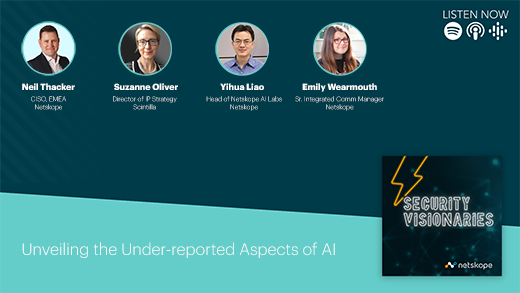Emily Wearmouth [00:00:01] Hola, y bienvenidos a esta edición de Security Visionaries, un podcast para cualquier persona que trabaje en los ecosistemas de ciberseguridad y Datos. Soy su anfitriona, Emily Wearmouth, y esta semana tengo tres invitados increíbles que aportan tres perspectivas diferentes a una discusión que quería tener con todos ellos sobre IA. Entonces, en primer lugar, permítanme presentarles a todos. En primer lugar, tenemos a Yihua Liao, que es un científico de Datos que ha trabajado para todos los grandes nombres, en realidad, Facebook, Microsoft, Uber, y ahora es el jefe de la AI Labs en Netskope. Así que bienvenido, Yihua.
Yihua Liao [00:00:31] Gracias. Me alegro de estar aquí.
Emily Wearmouth [00:00:32] A continuación, tenemos a Neil Thacker, que es director de seguridad de la información y un oficial de protección de datos con mucha experiencia. Ha trabajado con nombres importantes como Swiss Re, Deutsche Bank, Camelot, la compañía de lotería. Y también se ha desempeñado como asesor tanto para ENISA como para Cloud Security Alliance. Bienvenido Neil.
Neil Thacker [00:00:49] Gracias, Emily. Un gran placer estar aquí.
Emily Wearmouth [00:00:51] Y finalmente, Suzanne Oliver es nuestra experta en propiedad intelectual hoy. Suzanne trabaja en la práctica privada como estratega de propiedad intelectual y abogada en Cintra. Usaría para dirigir el departamento de propiedad intelectual en ARM y tampoco es ajena a Westminster en el Reino Unido, donde representa a varios organismos de propiedad intelectual y asociaciones de inteligencia artificial y aprendizaje automático a nivel gubernamental. Conocí a Suzanne por primera vez en la Semana de la Tecnología de Londres, donde tuvimos una gran conversación mientras tratábamos de comer cortésmente para pequeñas loncheras de cartón. Así que estoy muy contento de que se una a nosotros hoy para que pueda tener una segunda oportunidad de tener una primera impresión. Bienvenida, Suzanne.
Suzanne Oliver [00:01:23] Bueno, gracias. Y sí, fue un gran almuerzo. Bien. Gracias.
Emily Wearmouth [00:01:28] Entonces, la IA es un tema realmente publicitado, y creo que sería difícil encontrar a alguien que no haya hablado de IA este año. Y entonces te preguntarás, ¿qué podemos agregar a este enorme grupo de discusión? Y realmente, eso es lo que quería hacer hoy. Quería hacer esa pregunta a nuestros panelistas. Y por eso les he pedido a cada uno de ellos que estén preparados para responder una pregunta mía. Y esa pregunta es qué cosa, en medio de toda esta charla y la exageración en torno a la IA, ¿realmente le gustaría que se discutiera más? Todos llegan a esto desde un ángulo ligeramente diferente, así que veamos cuáles son sus respuestas. Y Neil, voy a Inicio contigo. Así que es un poco como una cita a ciegas. Primera pregunta para ti, por favor Neil.
Neil Thacker [00:02:05] Um, sí, quiero decir, es una gran pregunta. Creo. Quiero decir, por ejemplo, me encantaría que todo el mundo dejara de usar chatGPT, AI y ML son sinónimos, así que creo que nos ayuda a alejarnos de eso para que podamos comprender mejor y crear conciencia sobre cuán generalizada es la IA hoy en día. Creo que generalmente decimos que generalmente no se informa. Así que es similar a decir que alguien que tuvimos en el pasado, alguien que dice una Organización que dice, oh, por ejemplo, somos Usar la nube, pero en realidad son Usar miles de aplicaciones en la nube y cada una está realizando una tarea ligeramente diferente. Y creo que tenemos el mismo desafío con la IA. Ya está bastante generalizado en, nuevamente, Organización y, por supuesto, también en los consumidores. Están utilizando estas herramientas y servicios. Así que, de nuevo, ese sería el número uno. Y, por supuesto, quiero decir, importa debido a una serie de áreas clave. Quiero decir, uno es solo la conciencia general del Usar actual de la IA y también ser consciente de que no es una tecnología futura. Está sucediendo hoy. Creo que, en segundo lugar, debemos comprender a las personas y el tipo de negocio y los consumidores saben que la IA no es solo una aplicación específica. Entonces, un poco como decir que es ChatGPT. Quiero decir, mi odio favorito es cuando escucho algo decir que escucho a alguien hablar sobre IA y dicen que es IA como ChatGPT, es un error común pensar que solo hay unas pocas aplicaciones hoy en día que utilizan la capacidad de tipo IA. Así que vive en muchas de las aplicaciones que usamos hoy. Es ser Usar, es omnipresente. Es fundamental que la Organización y los consumidores entiendan qué razón, qué datos se están procesando, qué resultado se pretende a través del uso de esa aplicación y servicio. Así que ese es el tipo de aspectos clave que veo.
Emily Wearmouth [00:03:48] Brillante, gracias Neil. Tengo estoy viendo la reacción de Suzanne de que tengo una pregunta para ti en la parte posterior de esto. ¿Quién crees que debería ser el dueño de estas definiciones? Ya sabes, Neil no quiere que se defina solo como ChatGPT o ¿existe una definición o estándar común para la IA? Y si es así, ¿quién no lo hace o quién debería poseerlo?
Suzanne Oliver [00:04:07] De nuevo, muy buena pregunta. Nadie lo posee hoy. Y hay otros estándares que son Usar para describir niveles, por ejemplo, niveles de autonomía en términos de autos y vehículos autónomos. Y creo que esta era ciertamente está pidiendo a gritos un poco más de transparencia sobre qué es y qué no es IA y qué es ML. A menudo son Usar indistintamente, y en realidad son muy diferentes. Así que creo que hay mucha exageración, y creo que hay mucha exageración porque hay una falta de comprensión de lo que estos sistemas pueden y no pueden hacer. Pero por otro lado, hay una falta de comprensión de quién es el dueño de lo que entra y quién es dueño de lo que sale para recoger uno de los puntos de Neil, que es el más importante y creo que Netskope en uno de sus informes han destacado la cantidad de código fuente que realmente se ingresa en estas herramientas. El código fuente propietario puede ser una falta de comprensión de que estas herramientas no pretenden mantener ese secreto o no pretenden permitirle mantenerlo como propio. Y también afirman poseer cualquier producción. Así que toda esa área de la transparencia de quién posee qué. Cómo se llama y qué hace, creo que sí. Es correcto tal vez no la estandarización, pero es correcto que se cree un nuevo lenguaje que nos ayude a comunicar estos aspectos con mayor claridad a personas que no necesariamente los entienden de inmediato.
Emily Wearmouth [00:05:35] Neil, ¿tienes un ejemplo, hablas de que la IA ya es omnipresente y es una tecnología de hoy, no del futuro? ¿Tiene algún ejemplo de dónde haya visto IA en acción que la gente quizás no sabría buscarla allí?
Neil Thacker [00:05:47] Sí, quiero decir, hemos visto la introducción de muchos asistentes de IA, especialmente en reuniones y reuniones por videoconferencia, etc. Así que es bastante común Ahora me uno a una reunión y habrá un asistente de IA que a veces ocupe el lugar de alguien, lo que siempre es interesante. Pero sí, obviamente es de inmediato, quiero decir, verifico si hay asistentes en las reuniones. No todo el mundo lo hace. No todo el mundo se da cuenta de que hay un asistente de IA. Y creo que es, quiero decir, tal vez esté bien. Por ejemplo, si el asistente está tomando notas o tal vez documentando las actas de la reunión, lo cual es genial porque a la mayoría de la gente no le gusta hacer eso. Así que eso es genial. Vamos a automatizar esa capacidad. Pero, por supuesto, si ese sistema de IA está realizando un análisis de sentimiento adicional, tal vez esté mirando la puntuación del estado de ánimo, tal vez he visto esto, he visto que este asistente de IA hace una puntuación del estado de ánimo cada 5 segundos, lo que me preocupa un poco. Quiero decir, incluso tenemos esto, he visto algunos servicios de puntuación de Usar IQ, así que escuchar cómo las personas hablan e interactúan y tratar de evaluar su coeficiente intelectual. Ahora, por supuesto, si vas a hacer algo así en una reunión, debes decírselo a alguien de antemano porque es posible que quieran ir y verificar primero al proveedor, al proveedor de ese servicio, al asistente de IA, tal vez a su política de privacidad. Es posible que desee explicarlo por adelantado. Entonces, por supuesto, si estás teniendo un mal día, entonces tal vez no lo sé. Quiero decir, una de esas cosas es atrapar a alguien en algún momento. Quiero decir, ese es solo un ejemplo, tal vez un ejemplo crudo, pero creo que ahí es donde debemos comprender mejor las capacidades del servicio es lo que es capaz. No se trata solo de registrar y crear actas de reuniones. Hay tantas posibilidades allí. Y es hacer que la gente sea consciente de eso. Ahora, como ejemplo, volví a un proveedor, uno de estos servicios, y les pregunté, está bien, ¿cuál es su política de privacidad? Y su respuesta, no te preocupes, está totalmente cubierta. Y a pesar de todo, este es el futuro. Así que simplemente acéptalo. Así que de inmediato, las alarmas están sonando. Por supuesto que yo, por supuesto. Luego tuve que profundizar para averiguar exactamente qué ofrece su servicio. Así que creo de nuevo, es bastante difícil para la gente entender esto. Y de nuevo, a veces es demasiado tarde. Se les pone en un aprieto. Tienen que hacer una evaluación rápida, un juicio sobre estos servicios. Así que sí, se trata de comprender realmente esa comprensión. Una vez más, un nivel de confianza quizás por parte del proveedor de estas tecnologías y servicios.
Emily Wearmouth [00:08:12] Diría que es bastante audaz en este momento enviar IA a una reunión en lugar de ti. Todas las conversaciones sobre un pueblo que va a perder sus trabajos y que voluntariamente caminan por ese camino, ¿no es así?
Neil Thacker [00:08:23] Sí, supongo que el desafío es que cuando establecemos, todos enviamos a nuestro propio asistente de IA a la reunión. Quiero decir, ¿qué discuten? Me encantaría ser una mosca en la pared.
Emily Wearmouth [00:08:30] Con esto. Brillante. Yihua. Quería traerte. En este punto, está trabajando mucho en la creación de sistemas de IA y escribiendo modelos para modelos de aprendizaje automático. ¿Cuál es su opinión sobre el tipo de reetiquetado persistente de todo como ChatGPT? ¿Te parece frustrante?
Yihua Liao [00:08:49] Lo es, ya sabes, porque siento que el lavado de IA es definitivamente un problema. Ya sabes, está oscureciendo la claridad en la comprensión de la IA. Así que definitivamente me gustaría ver más discusión sobre la forma en que, ya sabes, las empresas de seguridad y quizás las empresas de tecnología en general, ya sabes, cómo estamos construyendo IA y ML, ya sabes, ¿cuál es la entrada para el modelo para la IA y cuál es el resultado y qué tan confiable es el resultado? ¿Derecha? Y siento que hay una falta de comprensión y falta de transparencia en esos aspectos. Entonces, como resultado, creo que hay algunos conceptos erróneos. Sabes, la forma en que veo, ya sabes, por lo general algunas personas pueden decir que, oye, puedo hacer todo. Ya sabes, va a tomar nuestros trabajos y, ya sabes, va a controlar todo lo que hacemos. Y luego también hay gente que dice, estás entrenando con mis Datos y no quiero que uses mis Datos para mejorar, para ayudar a mis competidores. Así que creo que tal vez desde que hice Netskope AI Labs y a lo largo de los años, hemos desarrollado muchas capacidades de IA en Netskope y antes de todo este frenesí general de IA. Entonces, tal vez podría compartir algunas de mis perspectivas y cómo construimos modelos de aprendizaje automático e inteligencia artificial en Netskope. Entonces, en primer lugar, hemos creado muchos modelos de IA en Netskope, incluidos modelos, para identificar malware, sitios web de phishing y datos confidenciales. Creo que Suzanne mencionó el clasificador de código fuente, eso es algo que mi equipo realmente construyó hace un par de años. Luego también usamos Usar Machine Learning para identificar comportamientos anómalos del usuario, que pueden indicar una violación de datos o una amenaza interna, etc. Entonces, a un alto nivel y la forma en que lo que entra en nuestros modelos son los Datos que intentamos recopilar de diferentes fuentes diferentes, incluidos los Datos en dominios públicos o los Datos que adquirimos de terceros. Por lo tanto, nunca usaríamos Datos para nuestros clientes para construir modelos de Machine Learning sin su permiso. Entonces, como puede imaginar, algunos de los modelos de aprendizaje automático, por ejemplo, como un análisis del comportamiento del usuario, para eso, necesitamos observar el comportamiento normal de cada usuario individual. Pero incluso para ese tipo de modelo, en primer lugar, tenemos el permiso de nuestros clientes. En segundo lugar, estamos viendo otra información que no estamos viendo, por ejemplo, cuando el usuario está descargando un archivo, no necesariamente necesitamos mirar el contenido del archivo para decidir si ese comportamiento es anormal o no. Derecha. Así que sí, eso es básicamente lo que, ya sabes, es lo que entra en el modelo. Ahora en términos de la salida del modelo. Y ya sabes, muchos de ustedes saben, hoy en día casi todas las empresas afirman que están haciendo IA, cuán precisos son los modelos de IA. Pero diría que si alguien te dice que su IA es 100% precisa, diría que está mintiendo. Ya sabes, al final del día, la IA es realmente una probabilidad, ya sabes, qué tan probable es que suceda algo en función de los datos de entrenamiento que tienen. Entonces, ya sabes, siempre necesitas algún humano en el bucle para verificar el resultado del modelo de IA o tal vez algún tipo de bucle de Comentarios dentro de tu producto para que puedas tomar esos Comentarios y volver a entrenar tu modelo y mejorar el modelo con el tiempo. Así que la IA es realmente un proceso innovador. Es un viaje, y nunca puedes esperar que el modelo sea 100% preciso o incluso como 99% preciso la primera vez. Siempre hay que iterar en el tiempo.
Emily Wearmouth [00:13:30] Puedo ver muchos asentimientos tanto de Suzanne como de Neil. Siéntase libre de saltar algo que quería agregar.
Suzanne Oliver [00:13:37] Sí, creo que el punto de confiabilidad con el que estaba muy de acuerdo y creo que es la falta de comprensión, especialmente, ya sabes, sé que este es el odio favorito de Neil, cuando pasas de la IA directamente a ChatGPT. Es un ejemplo bastante interesante en sí mismo que puede ser Usar ya que, ya sabes, presenta datos incorrectos como correctos porque no tiene comprensión de lo correcto y lo incorrecto de lo verdadero. Ya sabes, es solo la probabilidad de que esa sea la respuesta que estás buscando. Así es como funciona. Y creo que aquí es donde, ya sabes, mi punto anterior sobre la educación y las habilidades para entender que estas cosas son herramientas. Y al igual que los humanos, son falibles, pero son falibles de diferentes maneras. Derecha. Y creo que se cree que nosotros, como sociedad, debemos entender un poco mejor que, por lo tanto. Pero el punto sobre, ya sabes, tener esta transparencia de cómo los describimos, tal vez necesitemos categorizarlos de diferentes maneras funcionales y categorizar la salida de riesgo como los niveles de autonomía de los anteriores, pero sí, una especie de acuerdo vehemente de asentimiento.
Emily Wearmouth [00:14:54] Y Neil, quería preguntarte y tienes algo más que decir, así que siéntete libre de responder a ambos. Pero si algunos de los puntos que Yihua estaba captando resonaron con usted como alguien cuyo trabajo es proteger a Datos. ¿Qué tipo de preguntas le estás haciendo a alguien como Yihua en otras compañías de tecnología para llegar realmente al fondo de lo que estos sistemas están siendo construidos para hacer?
Neil Thacker [00:15:16] Sí, quiero decir, siempre se reduce a los Datos, ¿verdad? Entonces, las preguntas sobre qué sucede con los datos que se ingresan como parte de una consulta de entrada. Por ejemplo, si eres Usar genAI, lo que le sucede al modelo es que el modelo es Usar para, para, para proporcionar servicios adicionales de forma privada o pública y también lo que controla un análisis. Y obviamente se mencionó allí nuevamente un ejemplo de controles de Organización que se implementan, pero también es lo que sucede con la salida y si se realiza algún tipo de verificación de integridad en la salida y ¿puede la salida también ser Usar para revisar y preentrenar otros modelos? Derecha. Entonces, este es otro aspecto que, nuevamente, podría, por supuesto, entrar en un bucle y aprovechar aún más, refinar aún más la consulta de salida en función de una serie de tipos de bucles de Comentarios que utilizan servicios de IA. Pero, de nuevo, es importante entender que, de nuevo, ¿cuántos años tiene ese Datos? ¿Cuántas iteraciones ha pasado ese Datos? Pero también se reduce a cosas como, quiero decir, por ejemplo, ¿qué país? Creo que esto es algo sobre lo que definitivamente vamos a hacer más preguntas en un futuro cercano, ya que tal vez entren más regulaciones para proteger a las personas. Y escucharíamos que la IA de la UE actúa como una ley que entrará en vigor para proteger a los ciudadanos de la UE. Pero, por supuesto, eso generalmente significa que habrá una serie de otros requisitos regulatorios y regulaciones que provienen de otros países que quieren continuar haciendo negocios con la UE, ese tipo de cosas. Vimos que GDPR es un ejemplo. Así que esas son cosas a tener en cuenta. Una cosa que también agregaría es que creo que todos somos conscientes de esta llamada y tal vez otros son conscientes de este fenómeno de alucinaciones en el que la IA creará y ocasionalmente puede crear contenido imaginativo y creativo. Y no se basa en hechos o verdades. Vi esto recientemente como ejemplo. Alguien volvió a preguntar: "¿Cuál es el récord mundial de cruzar el canal a pie?" Y dio un nombre, una fecha y una hora de cruce.
Emily Wearmouth [00:17:20] Ese fue mi récord, Neil.
Neil Thacker [00:17:21] Así que sí, quiero decir, 14 horas, 51 minutos.
Emily Wearmouth [00:17:24] Me tomó años. Sí, sí.
Neil Thacker [00:17:26] Pero para algunas personas piensan, bueno, tal vez de nuevo era correcto. Tal vez alguien realmente cruzó el canal de la Mancha por el Túnel del Canal, por ejemplo. Pero luego el contenido de seguimiento decía que solo debían intentarlo nadadores profesionales. Así que puedes pensar que hay alguna alucinación. Así que ese es solo un ejemplo. Pero sí, creo que debemos ser conscientes de los Datos, la integridad, cómo se están protegiendo y también todas las regulaciones que probablemente entrarán. Pero en realidad estamos tratando de proteger, nuevamente, a los ciudadanos en torno al uso de estos servicios y qué datos se estaban procesando realmente.
Yihua Liao [00:17:59] Sí. Entonces, Neil, eso es tan cierto. Quiero decir, la alucinación es ciertamente un desafío para, ya sabes, practicantes como yo, estamos probando muchas cosas nuevas, tratando de minimizar la probabilidad de alucinación. Pero también me gustaría mencionar que, ya sabes, destacar el thuing que mencionaste antes. La IA se trata realmente de los Datos, ¿verdad? Tu IA es tan buena como tus Datos de entrenamiento. Ya sabes, si no tienes datos confiables y de alta calidad, si tus datos están sesgados y tu modelo no va a funcionar realmente bien, estoy seguro de que algunos de ustedes han escuchado la historia de que algunos de los modelos de IA de reconocimiento facial son menos precisos. Y cuando se trata de pieles más oscuras o mujeres, hay cierto sesgo de género y edad en la capacitación de Datos. Así que es un problema para nosotros para, ya sabes, empresas de seguridad como la nuestra, porque la mayoría de nuestros modelos de aprendizaje automático, no miramos cosas como la edad, el género y otra información de PII. Pero yo diría que aún es posible que el entrenamiento que usamos para entrenar nuestros modelos de IA no represente realmente lo que vemos en el mundo real. Entonces, ya sabes, como científico de Datos o científico de ML, siempre intentamos mejorar la calidad de nuestra capacitación de Datos para que sea más representativa de lo que vemos en el mundo real.
Neil Thacker [00:19:44] Sí, quiero decir, también estamos viendo, por ejemplo, toda la cadena de suministro y la economía de la IA, ¿verdad? Hay organizaciones que suministran Datos que pueden ser Usar para entrenar ese tipo de cosas, y que también hablamos de la integridad de los Datos. Y dónde fue que obtuvo Datos es un poco como la discusión de marketing. ¿De dónde se obtuvo esa información? ¿Se obtuvo con consentimiento? Todo ese tipo de cosas. Así que eso también lleva a una discusión, ¿verdad? Toda la encuesta económica sobre la cadena de suministro de donde provienen esos Datos, quién ha dado permiso o aprobación para procesar esos Datos. Derecha. Supongo que hay muchos requisitos y desafíos por los que la Organización debe pasar a medida que comienzan a considerar la IA y el Usar de la IA en su Organización.
Emily Wearmouth [00:20:28] Definitivamente. Y creo que esto es posiblemente lo que se relaciona bastante bien con la forma en que respondería a la pregunta. Suzanne. Tuvimos una charla previa, introduce tu respuesta. Entonces, ¿cómo responderías a la pregunta? ¿Qué es lo único de lo que te gustaría que se hablara más?
Suzanne Oliver [00:20:42] Sí, creo que ya lo he tocado. Definitivamente se trata de la transparencia de lo que entra y lo que sale y quién es el dueño de eso. Quiero decir, Datos per se no puede ser poseído per se, y ese es probablemente un tema completamente diferente en sí mismo, así que no entraré en eso. Pero creo que, basándose en el punto de Yihua sobre el sesgo inconsciente. Sabes que hay 35 sesgos cognitivos mínimos que tenemos como humanos, y probablemente podría haber nombrado tres si me hubieras preguntado antes de esta llamada. Entonces, ¿cómo podemos esperar que Datos que se está utilizando en estas herramientas sea representativo de nosotros si ni siquiera nos entendemos para empezar? Así que ese es uno, un elemento de mi respuesta a mi libro, debo decir. El otro es realmente quién es el dueño de la producción. Entonces, desde mi perspectiva, la IA toca principalmente los derechos de autor y la propiedad de los derechos de autor. Entonces, por ejemplo, si subo algunas fotos a una de estas herramientas y crea una especie de toma una de mis fotos y le pone una enmienda, entonces esa enmienda es propiedad de la herramienta. Entonces, por ejemplo, aquí serían OpenAI y ChatGPT, pero tengo la foto original, por lo que el resultado es un trabajo de Nuevo, por ejemplo, pero tal vez infrinja algo que ha sucedido antes porque miras hacia atrás con infracción y la innovación avanza. Así que, de nuevo, estos son conceptos muy difíciles de entender para los legos y también para los empresarios. Pero hay muy poco, a menos que seas una especie de geek de IP como yo, hay muy poco discutido al respecto. Y ciertamente el lenguaje no es fácil. Los derechos de autor no son un tema fácil de entender por completo. Así que creo que, como líderes tecnológicos, debemos ser los que hagamos que la conversación sea más transparente. Y esto vuelve al punto que estaba haciendo anteriormente sobre tener un lenguaje común que definimos para hablar sobre los datos que entran, los datos que salen y la herramienta en sí para que realmente podamos entender, monitorear y estandarizar algo de lo que está sucediendo para que sea más fácil entender lo que está sucediendo.
Emily Wearmouth [00:23:04] Desde su perspectiva, ¿hasta qué punto estamos tratando de cerrar la puerta del establo después de que el caballo se haya escapado? Quiero decir, hablas de cosas como que Facebook ha sido dueño de mis fotos de vacaciones durante más de una década. Suerte para ellos. Pero para los consumidores, parece que, hasta cierto punto, ese caballo se ha desbocado en términos de propiedad de Datos para alimentar estos sistemas. ¿Es ese el caso para las corporaciones o todavía hay una posibilidad de cerrar la puerta?
Suzanne Oliver [00:23:26] No estoy segura de que alguna vez vayamos a cerrar la puerta, pero creo que no tiene sentido sentarse allí y ver cómo el caballo se escapa y la distancia. Creo que tal vez haya un poco de acorralamiento por hacer. Y para mí, es la velocidad del cambio. Es la velocidad del cambio en términos de Organización, sin saber dónde está su pepita de oro Datos, quién lo maneja, quién lo está cargando en la nube. Y solo puedes manejar mi excepción. Pero no quieres que ocurran esas excepciones. Derecha. Así que creo que es realmente comprender el comportamiento de su ingeniero, el comportamiento de su gente de marketing y tener esas conversaciones con ellos sobre, está bien, estas herramientas son geniales. Te ayudarán a ahorrar algo de tiempo. Pero, ¿te das cuenta de que cuando tienes esta herramienta de secretaría ejecutándose en segundo plano, está en un servidor en un país donde tal vez no quieras que las actas de tus reuniones mensuales de la junta ejecutiva se almacenen en un servidor en ese país, sin importar cuánto tiempo te ahorre escribir esas actas? Entonces, si bien parece algo fácil de hacer, parece una herramienta eficiente para Usar, en realidad hay desventajas. Y se trata de tener ese poco de poder cerebral para decir, está bien, ya sabes, todo lo positivo tiene que haber una trampa. Aquí Neil aludió anteriormente está haciendo esas preguntas sobre, está bien, esta herramienta parece realmente eficiente, pero en realidad, ¿por qué es gratuita? ¿Por qué es barato? ¿Por qué cuesta menos que tener a una persona sentada allí, ya sabes, escribiendo las actas o compartiéndolas? Y tiene que haber un tiene que haber ese otro lado de la ecuación. Y creo que debes hacerte esa pregunta.
Neil Thacker [00:25:15] Sí, creo que quiero decir, una de las preocupaciones que tengo en general es que hoy en día ya estamos viendo a Organización, por ejemplo, emitir cuestionarios para comprender mejor el uso de la IA en un producto en un servicio. El desafío que siempre tiene es que un cuestionario suele ser, nuevamente, único, tal vez sobre la adopción de una herramienta Nuevo, una tecnología Nuevo que puede estar en IA, o podría ser una revisión anual de esa herramienta. Pero creo que siempre tiene que ser una etapa en el tiempo en la que casi estemos haciendo esto con más regularidad, de manera más continua, en función de, Suzanne, como destacó, esta rápida adopción, este rápido crecimiento de madurez en estos servicios. Quiero decir, una herramienta que podría adoptar y que hoy se verá muy diferente dentro de una semana o en dos semanas o en un mes a medida que se agreguen nuevas características y capacidades. Por lo tanto, casi tiene que ser una evaluación continua. Soy un gran fanático de mirar aplicaciones y servicios de puntuación y usar esto para definir Política en función de eso. Y nuevamente, podría ser, por ejemplo, quiero decir, incluso estamos viendo este desafío en torno a aplicaciones y servicios que se han visto comprometidos. Las reglas que han implementado, los proveedores no implementarían para proteger el servicio se han roto. Como la mayoría de las cosas que la gente va a hackear, los hackers van a hackear. Derecha. Así que también debes ser consciente de ese tipo de cosas. Y sí, también hay algunos, quiero decir, algunos Usar Caso descabellados en los que están llegando herramientas que tal vez están cruzando, cruzando la línea en términos de ética y que la Organización, por ejemplo, que son empleados de la Organización, por ejemplo, están utilizando y tal vez pueden cruzar su propia ética Política. Entonces, nuevamente, eso también debe ser parte de esa evaluación, ese puntaje de confianza. Ahí es donde realmente desde una perspectiva organizacional, Organización debería buscar proporcionar una mejor gobernanza de supervisión en torno a los servicios de IA.
Emily Wearmouth [00:27:02] Te pregunté al principio, Suzanne, quién debería ser el dueño de las definiciones y los estándares. Y de alguna manera, esto es una repetición de la pregunta de quién debería ser el dueño de la adjudicación de este tipo de decisiones. Neil aludió a los próximos actos de IA de la UE. Y hemos visto muchas posturas de gobiernos de todo el mundo que intentan ser vistos para asumir un papel de liderazgo en el desarrollo de la IA. Pero, ¿es realista algo que se puede regular o debería provenir del sector? ¿De dónde cree que viene el liderazgo?
Suzanne Oliver [00:27:34] Creo que siempre funciona cuando viene de Sector, personalmente hablando. Pero al final del día, creo que los organismos de estándares hacen un muy buen trabajo. Entonces, la autonomía de estos seis niveles, de 0 a 5 niveles de autonomía, creo que SEA la mantiene, que es una organización automotriz autónoma a menos que me equivoque. Tienes que Internet está actualmente regulado por organismos independientes. Entonces, ya sabes, mi voto sería por un organismo independiente. Pero desde la perspectiva del sector, de lo contrario no creo que me quede. Um, pero ciertamente y también se ha mencionado en esta llamada, creo que Yihua mencionó el concepto de lavado verde. No creo que deba ser una autocertificación. Hay demasiado de eso con algunas compensaciones de carbono y de carbono y ese tipo de cosas que, ya sabes, somos, ya sabes, creo que éticamente, ya sabes, verdes o lo que sea con un poco de tecnología ética, he visto demasiadas startups que tienen un algoritmo de ML ejecutándose en su maquinaria y luego tienen todo su tipo de pitch decks, ya sabes, donde la empresa I maquinaria, ya sabes, son un algoritmo de visión por computadora listo para usar. Creo que eso tampoco es ayudar a nadie a entender qué es, para qué está ahí, qué valor aporta también. Pero a muchos puntos que tanto Neil como tú hicisteis en esta llamada.
Emily Wearmouth [00:29:20] Yihua, ¿qué hay de ti como alguien que está desarrollando estas cosas, cuánta responsabilidad crees que deberían asumir los propios desarrolladores y cuánta es injusta? Y ya sabes, se les debería dejar crear cosas que, como sociedad más amplia, tal vez regulemos.
Yihua Liao [00:29:32] Creo que nosotros, como profesionales de la IA, también deberíamos tener mucha responsabilidad cuando se trata de una IA responsable. Aquí en Netskope tenemos un comité interno de gobernanza de IA para ayudarnos a establecer la estrategia de IA, configurar los procesos de revisión, etc. Y cada vez que comenzamos a trabajar en una iniciativa Nueva o en un modelo de Nueva IA, siempre tenemos que pasar por un proceso interno de revisión de seguridad y privacidad muy sólido, y tenemos que completar cuestionarios y luego dejar muy claro, ya sabes, lo que entra en el modelo. Cuál será el modelo, cómo será el modelo, si hay algún problema de privacidad, etc. Entonces, creo que algunos, no solo el gobierno y el sector, sino también todas las empresas y todos los profesionales de la IA deberían ser conscientes de esto y tomarlo en serio. Y para asegurarnos de que todos podamos construir sistemas o productos de IA de manera responsable.
Emily Wearmouth [00:30:48] Gracias. Esa fue una pregunta cruel para ti. Así que gracias por abordar eso. Así que realmente estoy disfrutando de esta conversación y no tengo ninguna duda de que si estuviéramos cómodamente instalados en el pub británico, probablemente podría continuar durante muchas horas más. Pero nuestro productor me está saludando con la mano, y esa es mi señal para hacer sonar el silbato e intentar y envolverlos. Así que voy a intentar y resumir y siéntase libre de interrumpir si lo estoy haciendo mal. Creo que es justo decir que hay muchos hilos entrelazados entre las diferentes formas en que ustedes tres han respondido a mi pregunta, pero también parece que hay mucho consenso. Y creo que todos están de acuerdo en que queremos que la gente deje de usar chatGPT, AI y ML como sinónimos. Así que Neil, todos respaldamos tu deseo e intentaremos trabajar en eso. Nosotros también caímos en la trampa en esta discusión. No sé si te diste cuenta de que me refería al mismo ejemplo, pero debemos hacerlo mejor. Y también, creo, estuvimos de acuerdo en gran medida en que sería beneficioso tener una especie de tipo más explícito debajo del capó o bajo el capó para el detalle del oyente estadounidense detrás de este brillante etiquetado de IA que la gente está poniendo en todo, ya sea en busca de la atención de la prensa o de altas valoraciones, para que Organización y los usuarios puedan comprender mejor cuánto riesgo deberían aplicar en sus evaluaciones y qué puede y no debe confiar. Y luego creo que el punto final que tocamos a lo largo de todo el proceso y que surgió de tu respuesta principal, Suzanne, fue que definitivamente nos beneficiaríamos de más conversaciones sobre la propiedad de Datos dentro de toda la cadena de suministro de IA, tanto con respecto a lo que entra como a lo que sale. Entonces, simplemente construir una mayor comprensión dentro de la sociedad, las empresas y las personas sobre cómo se ve esa conversación sobre la propiedad para que las personas puedan tomar decisiones informadas. Pero solo pensando en esa lista, ¿sabemos cuánto sabemos? Quiero decir, es una lista muy modesta.
Neil Thacker [00:32:36] Suena fácil.
Suzanne Oliver [00:32:37] Yeah, all solved. In one podcast.
Emily Wearmouth [00:32:41] Listo, deberían conseguirnos un más a menudo. Les agradezco a todos ustedes por su tiempo y por una conversación tan interesante y multifuncional, supongo, con todos ustedes que vienen con su perspectiva. Y entonces, a nuestros oyentes y solo quiero decirles que los veremos la próxima vez en Security Visionaries. Gracias.
Yihua Liao [00:33:00] Gracias.
Neil Thacker [00:33:00] Gracias a todos.
Suzanne Oliver [00:33:01] Gracias.






















)



